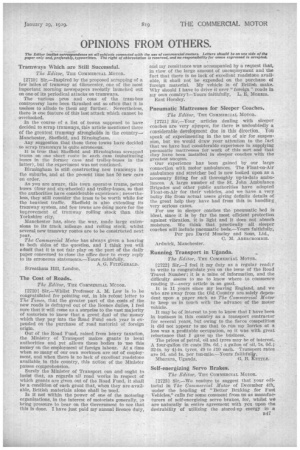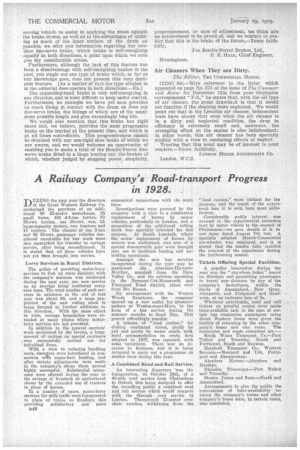OPINIONS FROM OTHERS.
Page 31

Page 32

If you've noticed an error in this article please click here to report it so we can fix it.
Tramways Which are Still Successful.
The Editor, TEE COMMERCIAL MOTOR.
[2719] Sir,—Inspired by the proposed scrapping of a few miles of tramway at Gloucester, one of the most important morning newspapers recently launched out on one-of its periodical attacks on tramways.
The variOus pros and cons of the tram-bus controversy have been thrashed out so often that it is useless to allude to them any further. Nevertheless, there is one feature of this last attack which cannot be overlooked.
In the course of a list of towns supposed to have decided to scrap tramways, this article mentioned three of the greatest tramway strongholds in the country— Manchester, Sheffield, and Birmingham.
Any suggestion that these three towns have decided to scrap tramways is quite erroneous. It is true that Sheffield and Birmingham scrapped trams on one short route in each case (substituting buses in the former case and trolley-buses in the latter),. but the experiment was not continued.
Birmingham is still -constructing new tramways in the suburbs, and at the present time has 50 new cars on order.
As you are aware, this town operatas trams, petrol buses (four and six-wheeled) and trolley-buses, so that the authorities have considerable experience ; nevertheless, they still consider the tram to -be worth while for the heaviest traffic. Sheffield is also extending its tramway system, and few towns are flo;ng more for the improvement of tramway rolling stock than -this Yorkshire city.
Manchester has, sinCe the war, made large extenSlams to its track mileage and rolling stock, whilst several new tramway routes are to be constructed next year.
The Commercial Motor has always given a hearing to both sides of the question, and I think you will admit that it is not fair play on the part of the daily paper concerned to close the office door to every reply to its erroneous statements.—Yours faithfully, A. G. FITZGERALD, Streatham Hill, London.
The Cost of Roads.
The Editor, TEE COWEMEROIAL MOTOR.
[2720] Sir,—Whilst Professor A. M. Low is to be congratulated for pointing out, in his recent letter to The Times, that the greater part of the costs of the new roads is defrayed out of the licence duties, I feel sure that it will come as a surprise to the vast Majority of motorists tO know that a great deal of the money which they pay into the Road Fund each year IA expended on the purchase of road material of foreign Origin.
Out of the Road Fund, raised from heavy taxation, the Ministry of Transport makes grants to local authorities and yet allows these bodies to use this money on the employment of foreign labour. At a time when so many of our own workmen are out of employment, and when there is no lack of excellent roadstone available. in this country, this action of the Minister passes comprehension.
Surely the Minister of Transport can and ought to insist that, as regards all road works in respect of which grants are given out of the Road Fund, it shall be a condition of each grant that, when they are available, British materials alone shall be used.
Is it not within the power of one of the motoring organizations, in the interest of motorists generally, to bring pressure to bear• on the Government to see that this is done. I have just paid my annual licence duty,
and my remittance was accompanied by a request that, in view of the large amount of unemployment and the fact that there is no lack of excellent roadstone available, it shall not be expended on the purchase of foreign material. My vehicle is Of British make. Why should I have to drive it over " foreign " roads in my own country ?--Yours faithfully, L. U. Mcmass.
East Horsley.
Pneumatic Mattresses for Sleeper Coaches.
The Editor, THE COMMERCIAL MOTOR.
[27211 Sir,—Your articles dealing with sleeper coaches are very apropos, for there is undoubtedly a considerable development due in this direction. You speak of .experimenting in the use of air for suspension, but we would draw your attention to the fact that we have had considerable experience in supplying pneumatic mattresses for work of this sort and that they have been installed in sleeper coaches with the greatest success.
Our experience has been gained by our large connection, with motor ambulances. The Float-on-Air ambulance and stretcher bed is now looked upon as a necessary fitting for all thoroughly up-to-date ambulances. A large number of the St. John Ambulance Brigades and other public authorities have adopted Float-on-Air for their vehicles, and we have a very bulky ffle from actual users giving definite details of the great help they have had from tills in handling very serious cases. For use in sleeper coaches the pneumatic bed is Ideal, since it is by far the most efficient protection against vibration, it is light and it does not absorb moisture. We think that practically all sleeper coaches will include pneumatic beds.—Yours faithfully, Per pro David Moseley and Sons, Ltd., C. M. ABERCROMBIE. .Arclsvick, Manchester.
Running Transport in Uganda.
• The Editor, THE COMMERCIAL MOTOR.
[2722] Sir,—I feel it my duty as a regular reader to write to congratulate you on the issue of the Road Travel Number ; it is a mine of information, and the difficulty Seems to me to know where to commence reading it—every article is so good.
It is 11 years since my leaving England, and we who are away from the Old Country are solely dependent upon a paper such as The Commercial Motor to -keep us in touch with the advance of the motor vehicle.
It may be of interest to you to know that I have been in business in this country as a transport contractor for several years, but owing to the fierce competition it did not appear to me that to run my lorries at a loss was a profitable occupation, so it was with great reluctance that I gave up the business.
The prices of petrol, oil and tyres may be of interest. 'A foutsgallon tin coats 29s. 6d.; a gallon of oil, 78. Gd.; 32-in. by 41-in, tyres, fi) to £10 each. Transport rates are 90. and Is. per ton-mile.—Yours faithfu Delbardra, Uganda. G. B. STILE.
Self-energizing Servo Brakes, The Editor, Tits COMMERCIAL MOTOR. [2723] Sir,—We venture to suggest that your editorial in The Commercial Motor of December 4th, under the heading of "Better Braking for Fast Vehicles," calls for some comment from us as manufacturers of self-energizing servo brakes, for, whilst we are naturally in entire agreement with yen upon the desirability of utilizing the stored-up energy in a B47
moving vehicle to assist in applying the shoes against the brake drums, as well as to the advantages of utilizing as much 0 the inner surface of the drum as possible, we offer you information regarding our twoshoe dpo-servo brake, which brake is self-energizing equally In both directions, a point upon which we note you lay considerable stress.
Furthermore, although the lack of this feature has been a disadvantage with self-energizing brakes in the Past, you single out one type of brake which, so far as our knowledge goes, does not possess this very desirable feature. [As a matter of fact the type alluded to in the editorial does operate in both directions.—En.1
The expanding-band brake is only self-energizing in one direction, and is most difficult to keep under control. Furthermore, no example we have yet seen provides as much lining in contact with the drum as does our duo-servo brake, -the linings of which are of the maximum possible length and give exceedingly long life.
We would also mention that this brake has rigid shoes and, we believe, provides the most progressive brake on the market at the present time, and which is at all times controllable. This progressiveness cannot be obtained with any non-rigid shoe brake of which we are aware, and we would welcome an opportunity of enabling you to make a trial of the Bendix-Perrot duoservo brake fitted to a large touring car, the brakes t.f which, whether judged by stopping power, simplicity, progressiveness, or ease of adjustment, We think are an achievement to be proud,of, and we venture to predict that this is the brake of the future—Yours
127241 Sir,—With reference to the letter which appeared on page No. 575 of the issue of The Commercial Motor for December 11th from your Orpington correspondent " ES.," he states that, with the oil type of air cleaner, the great drawback is that it would not function if the cleaning were neglected. We would point out that in the Lemoine air cleaner, independent tests have shown that even when the air cleaner is in a dirty and neglected condition, the drop in efficiency is extremely small and, moreover, the strangling effect on the engine is also infinitesimal; in other words, this air cleaner has been specially studied with a view to combating effects of neglect.
Trusting that this point may be of interest to your readers.—Yours faithfully, LONDON MOTOR ACCESSORIES Co. London, W.C.2.


































